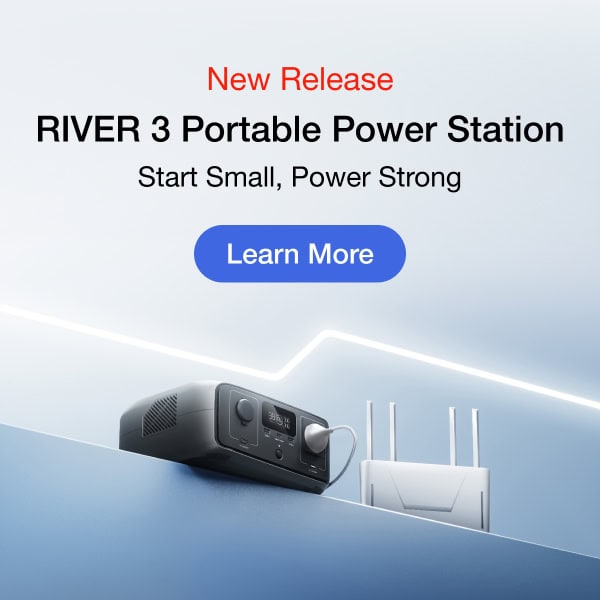Table of Contents
Portable refrigerators are an excellent way to upgrade your next camping, fishing, or road trip.
The right portable fridge can provide all the benefits you’d get from a home refrigerator but on a smaller scale.
Of course, there’s a lot to know before making a purchase decision to ensure that you’re going with a model that meets your needs.
When you get down to basics, there are three different types of portable fridges. Each with its advantages and disadvantages.
Understanding the available types of portable refrigerators will help you select an option that best suits your requirements.

What Are the Types of Portable Refrigerators?
In general, portable fridges use one of three cooling technologies.
Below are the most common types of portable refrigerator and their power requirements.
Consider the advantages and disadvantages of each cooling type to find a model that delivers your needs.

Compressor Portable Fridges
A compressor-powered cooling option is your best bet if you are looking for a full-time portable refrigerator. Compressor fridges are the only “true” portable refrigerator; the other options below are technically “coolers.”
Compressor refrigerators — like the one in your home — use a motor and chemical refrigerants to keep their contents cold. Breakthroughs in compressor motors have made the newest models highly efficient. Compressor fridges as freezers and come in multiple configurations.
Unlike other fridge types, they don’t require being perfectly level to operate. Compressor fridges use electricity to run. As long as you have access to on-grid electricity or a sufficiently powerful generator, you have what you need to keep your food and beverages cold and your ice frozen.
If you’re looking for an off-grid fridge, you can run a compressor fridge using clean, renewable solar power. You only need solar panels and a portable power station with adequate solar input, electricity storage, and AC output capacity.
Compressor fridges also allow you to control temperature settings. An off-grid portable compressor fridge like the EcoFlow GLACIER can act as a fridge, freezer, and ice maker.
With the other types of portable fridges, you won’t have much control over the temperature.
Of course, exceptional benefits and functionality come at a price.
Portable compressor refrigerators are often expensive, which can be the biggest downside of choosing this type.
However, the benefits will likely outweigh the costs if you plan to use your portable fridge off-grid regularly.
Power Requirements
Modern portable compressor fridges are energy efficient and won’t quickly consume your battery power supply as much as other types might.
Similar to your home refrigerator, portable compressor fridges cycle on and off to regulate the interior temperature and conserve electricity.
Keep in mind, if you’re operating the fridge in hot conditions, the compressor will need to work harder and consume more electricity. Ambient temperature can result in variations in power usage, but the best models remain energy efficient.

For example, when connected to a standard household plug, the GLACIER Portable Refrigerator consumes just 180 Wh of AC electricity. If you add the optional plug-in battery, the GLACIER can recharge from 0-100% using only 298 Wh of electricity and run continuously for up to 40 hours!
Adding the plug-in battery also allows you to recharge using solar panels wherever there’s sunlight. With 240W of solar input, you can fully recharge your GLACIER in as fast as 2.1 hours using solar panels, depending on environmental conditions.
Advantages
- Energy efficient
- Thermostatic temperature control
- Works as a fridge and freezer (and an icemaker if it’s the GLACIER!)
- Level surface not required to function
- Best option for regular use
Disadvantages
- Can be pricey
- May not be the most cost-effective choice for occasional use
Thermoelectric Portable Fridges
Thermoelectric portable fridges, or thermoelectric portable coolers, are not ideal if you need a reliable way to store food safely. They’re much better for keeping food and beverages cold short term or even to keep a dish warm. Thermoelectric coolers also feature a function to keep food warm.
The refrigeration capabilities of thermoelectric devices vary considerably based on the ambient temperature. It can be a viable option if you want to use it primarily in locations where the outdoor temperature is low — such as submerging the cooler in a cold river while fishing.
However, in warmer climates, you won’t be able to store raw meat or dairy — or keep vegetables fresh. Without adequate refrigeration, you could put yourself and your family at risk of foodborne illness.
Unless you only use your fridge for short periods or just to cool down some beers, only a compressor fridge can reliably meet your needs. You need a refrigerator that consistently stays at 40°F or below (4.5°C), and the freezer should be at 0°F (-17.78°C).
A thermoelectric cooler can’t meet the minimum cooling requirements for food safety for anything more than a very short duration.
Power Requirements
Thermoelectric portable fridges typically consume 55 – 85Wh of electricity when running, consuming less energy than the typical compressor fridge.
Keep in mind, low electricity consumption doesn’t equate to energy efficiency. You might consume less power — but you get less bang for your buck.
Many thermoelectric coolers also offer multiple charging options.
Advantages
- Suitable for short periods in cool temperatures
- Can keep food warm as well as cool (but not at food-safe temperatures)
- Low electricity consumption
- Quiet
Disadvantages
- Cooling capabilities highly dependent on ambient temperature
- Low energy efficiency
- Expensive
Absorption Portable Fridges
Absorption portable coolers chill their contents by evaporating coolant on one side and absorbing heat from the surrounding contents through a second coolant system. They run on 110V AC, 12V DC, or propane, which does give you several options to keep your fridge cold.
One drawback of absorption fridges is they require a level surface to function correctly. Level ground can be hard to come by, depending on where you take your portable refrigerator.
Similar to a portable thermoelectric fridge, how much they can cool depends on the temperature outside. They’re best for users who already use propane for other applications — such as a gas stove in a motorhome.
Power Requirements
Absorption refrigerators have several power options—they can run on 110V AC, 12V DC, or propane. However, that does come with drawbacks.
They’re highly inefficient when running on 12V DC power—using ten times as much power as a portable compressor refrigerator! Keeping them running around the clock using 110V AC results in even more draining of your inverter.
While they’re efficient when powered by propane, you must deal with fuel lines and vent the unit to avoid exposure to poisonous gases. Propane (LPG) burns cleaner than other fossil fuels but still produces greenhouse gas emissions.
Advantages
- Fossil fuel power source option (propane)
- Efficient when using propane for fuel
Disadvantages
- Requires a level surface
- Lacks temperature control
- Cooling abilities based on the outside temperature
- Consumes more electricity than other portable units
- Not eco-friendly

What to Consider When Choosing a Portable Fridge
Now that you understand the different types of portable refrigerators — and their advantages and drawbacks — here are some other things to consider when deciding between the different options.
Pricing
Your budget may determine which portable refrigerator is within reach. While a portable compressor refrigerator has the most advantages, it can also have a higher price tag.
Check out different types of units available and see what is within your price range while delivering the cooling capabilities you require.
Capacity and Portability
When shopping for your portable refrigerator, you’ll want to consider how much you want it to hold. Of course, with a larger capacity, you’ll end up with larger dimensions and weight.
Finding the right size portable fridge is a delicate balance between storage capacity and mobility.
Portability is a significant concern if you’ll be transporting your fridge to various campsites and off-grid locations. However, mobility may not be an issue if you use it as a stationary unit in a tiny home or van.
Power Source
Virtually every portable fridge comes with the option to be powered by AC electricity. Many offer other options. Consider whether you need a portable refrigerator that can run on AC, DC, solar, propane, or battery storage.
Consider what power sources will be available where you want to operate your fridge, and choose a model that matches accordingly.
For portable fridges that run on electricity, you can also look into expanding the power options. The EcoFlow GLACIER, for example, has an optional plug-in battery that provides up to 40 hours of wire-free runtime — or more when you add a solar panel for direct charging. No balance of system required!
It can also operate for extended periods using a solar generator, such as the DELTA 2 Portable Power Station w/220W solar panel, which can power additional appliances simultaneously.
Energy Efficiency
Energy efficiency might not be a huge priority if you’re looking for something for road trips to keep your beverages cool. However, if you need to keep foods stored at a safe temperature for long periods, energy efficiency (and electricity costs) are likely a significant concern.
Consider how long your unit will run and ensure you purchase an energy-efficient option. It will save you money in the long run.
Warranty
Consider the warranty offered with the unit before purchasing. If something goes wrong, it’s always good to know whether or not you are covered!
Buyer beware! A cheap portable fridge with a 1-year warranty is probably not a wise long-term investment.

Additional Features
Smart technology has transformed many appliances, including portable refrigerators.
Look for additional features like Bluetooth capability, smartphone app control, dual-temperature function, etc.
You might also find features beyond cooling, such as ice-making or direct solar charging.
Consider what you value in a portable fridge and whether additional features make one appliance stand out.

Which Type of Portable Fridge is Right for You?
The answer to this question depends on what you want to accomplish with your appliance.
You might opt for a thermoelectric cooler if you want something that can cool and heat foods without worrying about food safety.
An absorption cooler might be your best bet if you want a fridge that runs on propane.
A portable compression fridge is likely your best choice for most other applications.
Remember the advantages and drawbacks of each option to select the ideal portable refrigerator for your needs.

Final Thoughts
There are many factors to consider when selecting the right portable refrigerator.
After reading this article, you should be well-equipped to choose the perfect portable refrigerator for you.
EcoFlow’s GLACIER Portable Refrigerator is an energy-efficient compressor refrigerator with a dual storage compartment, independent temperature control, an icemaker, and multiple power input options, including AC, DC, and direct solar.
Check out EcoFlow today for more info and other off-grid power solutions.






